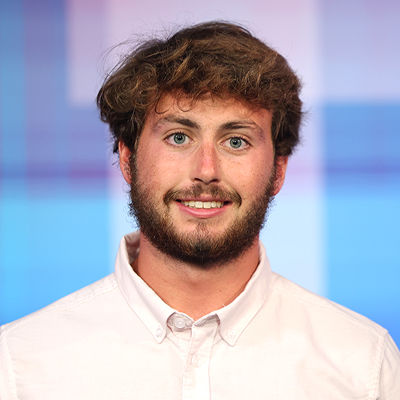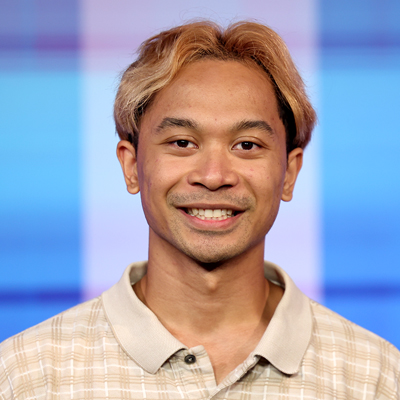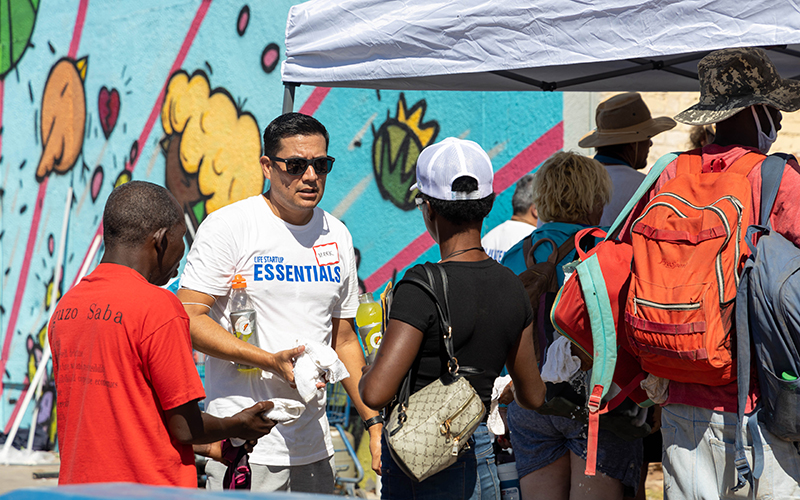
Mark Newell, CEO of Life Startup Essentials, hands out wet towels outside the Project Connect event at the Human Services Campus in downtown Phoenix on Aug. 30. (Photo by Drake Presto/Cronkite News)
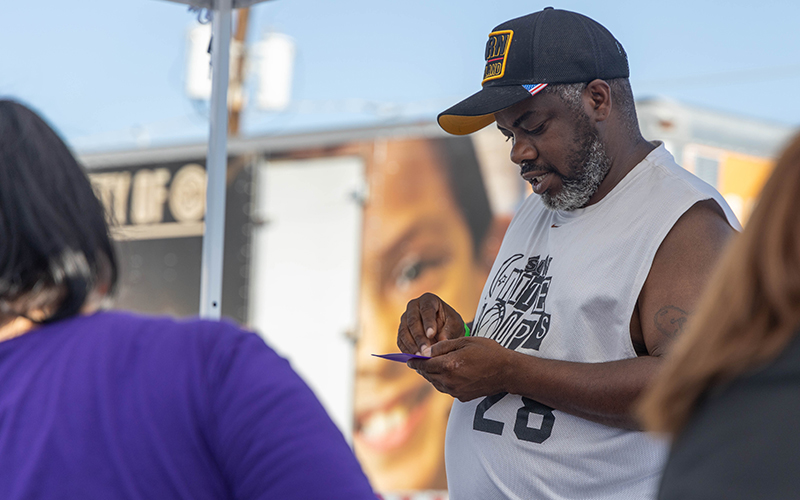
Anthony Gray talks with Mercy Care representatives about their not-for-profit health plan at the Human Services Campus. (Photo by Drake Presto/Cronkite News)
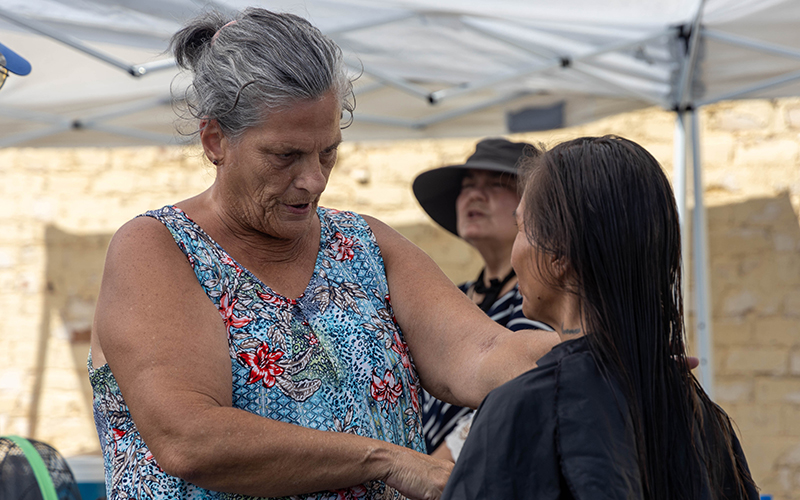
Sharleen Kakalewska prepares to cut a client’s hair at the Human Services Campus. Kakalewska volunteers with the Church of the Palms, United Church of Christ, which offers free showers, haircuts and hygienic products. (Photo by Drake Presto/Cronkite News)
PHOENIX – On one of the hottest days of the summer, tents and volunteers popped up in a parking lot across from the Human Services Campus to serve the large population of unsheltered people in the downtown area.
Project Connect, which provides such resources as medical and housing assistance, and helps acquire proper identification, set up last week near Madison Street and 12th Avenue.
Human Services Campus, which administers the program, is a nonprofit organization that offers housing resources across metro Phoenix and provides a gated and shaded outdoor campus for unsheltered people to congregate. It also offers food, legal aid and health care assistance.
Since being restarted last year, Project Connect has had rotating events around the Valley once every four to six weeks to bring critical resources to communities with unsheltered people. The Aug. 30 event in Phoenix served more than 200 unsheltered people who live on the streets around the Human Services Campus and at CASS, which operates an emergency shelter at Madison and 12th.
“Today is special because we’re just adjacent to where we are every day,” said Amy Schwabenlender, executive director of Human Services Campus. “We did this on purpose because we have over 800 unsheltered people, and they don’t all even know what’s right across the street. So by bringing the services right here into this parking lot, where they’re more familiar with seeing outreach staff, they can come in, they can connect with services and learn about what’s available to them every single day.”
Anthony Gray, 44, was at the event for his first time. He was one of the many to receive not only health care from a Mercy Care table, but coffee, food and water.
“All this stuff out here is free,” Gray said. “They are here to help, not disrespect you or kick you away or say, ‘We don’t want to help you because you stink. You need the help? Come over here and get the help.’”
Project Connect’s strategy centers on going to communities and offering services in their backyard.
“That’s what we’re all about really is meeting people where they are, just to make it one step easier for people to access things like shelter,” said Teresa Hauer, Human Services Campus development manager. “Whether it’s getting your ID, getting your license, all these kinds of things that are essential, bringing them to people rather than telling them where to go is just the best scenario.”
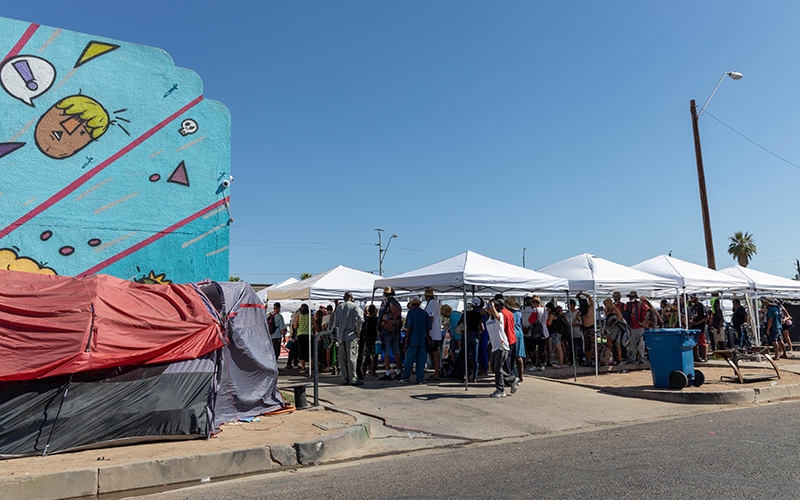
Shade is provided outside the Project Connect event at the Human Services Campus in downtown Phoenix, as temperatures exceed 100 degrees. The event brought volunteers together to offer services to the unhoused population living outside the campus. (Photo by Drake Presto/Cronkite News)
Project Connect has been to Tempe, Surprise and the Sunnyslope neighborhood of north-central Phoenix. From Surprise, Hauer said, an outreach team went to Wickenburg to expand access to resources even further. She said it’s important to meet people between cities as best they can.
Hauer said that she has heard volunteers tell her that they’ve seen unsheltered clients leave these events with keys to an apartment or with a new case manager who can find them a place to stay the next day. Her group works with the state Motor Vehicle Division, the Social Security Administration and the Homeless ID Project so that unsheltered clients can start or continue the process of finding permanent housing.
“We need to get these people in homes,” volunteer Rachel Youngworth said. “So having support like that and letting them know what they qualify for, that’s the most important as well as getting them healthy.”
The unsheltered population in Phoenix has increased 78% since 2018, according to the Maricopa Association of Governments’ Point-in-Time Homeless Count. Schwabenlender is worried by the rising number of young people experiencing homelessness.
“I don’t want to sound like a pessimist, but I think that the need is going to increase probably over the next two years,” she said. “It will really be over the next two years where we see homelessness increasing, and we will see more people coming out for help.”
At Tuesday’s event, Yassimin Ansari, who represents District 7 on the Phoenix City Council, touted the success and versatility of Project Connect. She said that barriers for unsheltered people to gain affordable housing need to be removed, and this program helps them break through. Building trust between the city government and the unsheltered community is vital to solving the housing crisis in Phoenix, she said, and that the city has invested “tens of millions of dollars” into building new shelters in the city.
“We really need folks to advocate for that as well to make sure that their elected leaders know that this is a priority. We want to make sure every person has access to housing and access to a dignified life,” Ansari said.
